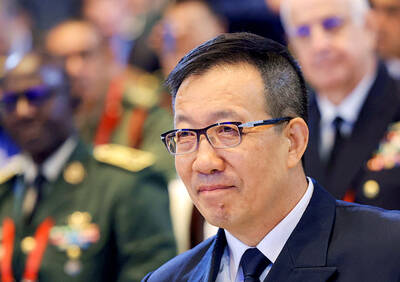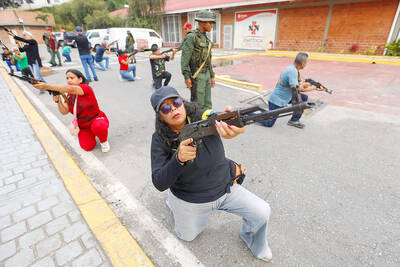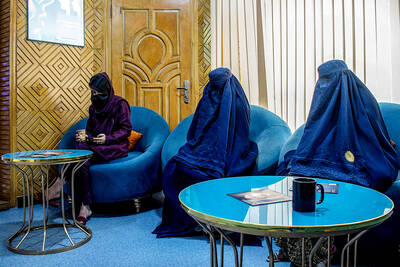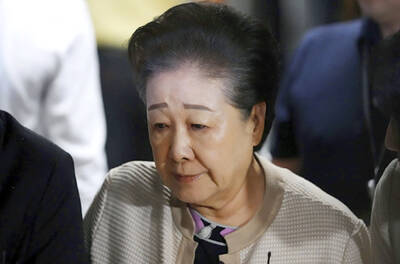China wants to expand its global media presence to reflect its burgeoning influence on the international stage, and has tapped a few major groups with massive financial backing for the job.
In a symbol of this new ambition, Chinese President Hu Jintao (胡錦濤) personally opened last week’s inaugural World Media Summit, organized by Xinhua news agency, bringing together executives from 170 media outlets.
In the massive formal reception rooms of the Great Hall of the People on Beijing’s Tiananmen Square, foreign delegates applauded as Hu offered a vision of a “true, correct, comprehensive and objective communication of information.”
To the right of Hu sat media mogul Rupert Murdoch.
His News Corp, the Associated Press, Reuters, the BBC, Russia’s ITAR-TASS, Japan’s Kyodo agency, Turner Broadcasting System (TBS) and Google agreed to co-host the so-called “Media Olympics” — organized at great expense by Beijing.
Agence France-Presse (AFP) participated in the debates, most of which related to the challenges of reporting in a digital and multimedia age.
Stung by several high-profile public relations disasters last year, including the chaotic Olympic torch relay, Beijing has tasked two or three signature media groups with projecting the image of a powerful China abroad.
It has earmarked 45 billion yuan (US$6.5 billion) to fund the expansion of groups including Xinhua, state television CCTV and CRI radio, Hong Kong media reported — at a time when the industry is facing a major money crunch elsewhere.
Xinhua — which is planning to add to its 117 bureaus around the world reporting in eight languages — would like to join the tight circle of international news agencies.
“We are in a restructuring phase — we’ve just opened a multimedia desk,” Xinhua president Li Congjun (李從軍) said.
The agency has opened a video service and is starting to offer mobile applications.
CCTV just launched an Arabic-language channel, reaching 300 million people in 22 countries, and is gearing up to start a Russian service.
CRI, which already broadcasts in 43 languages, is also expanding its presence abroad.
China wants to set up media and entertainment conglomerates similar to News Corp or Time Warner, with some private funding.
“As China moves from a domestic-oriented participant to an international industry leader, it will grow its own Time Warner,” said Steve Marcopoto, president and managing director of TBS Asia-Pacific Ltd, part of the Time Warner group.
Murdoch said he was “genuinely looking forward to that competition” from China, but also railed against the “lack of intellectual property protection domestically” and what he called “content kleptomaniacs.”
“There are interesting media companies emerging in China but piracy will make it difficult for them to generate the profits at home that would fuel growth abroad,” he said.
He told summit participants that the groups were “not exposed to the competition that would prepare them for the rigors of the global marketplace,” calling on China to open the “digital door” of its media market.
China has the world’s biggest population of Internet users at 338 million, according to official figures.
Freedom of information, a vital theme to address in a country where the press is subject to tight restrictions, was neither part of the World Media Summit agenda nor was it raised by participants so as not to offend the host.
Clive Marshall, chief executive of the Australian Associated Press, was a notable exception.
“There must be no compromise on the quality of news and no censorship of the news,” he said as he summarized a roundtable discussion on behalf of all its participants.
As for next year, China suffered a setback — none of the co-hosting foreign groups offered to put on a similar event next year.

BEIJING FORUM: ‘So-called freedom of navigation advocated by certain countries outside the region challenges the norms of international relations,’ the minister said Chinese Minister of National Defense Dong Jun (董軍) yesterday denounced “hegemonic logic and acts of bullying” during remarks at a Beijing forum that were full of thinly veiled references to the US. Organizers said that about 1,800 representatives from 100 countries, including political, military and academic leaders, were in Beijing for the Xiangshan Forum. The three-day event comes as China presents itself as a mediator of fraught global issues including the wars in Ukraine and Gaza. Addressing attendees at the opening ceremony, Dong warned of “new threats and challenges” now facing world peace. “While the themes of the times — peace and development —

Venezuela on Saturday organized a day of military training for civilians in response to the US deployment in the Caribbean, and amid new threats from US President Donald Trump. About a month ago, Washington deployed warships to international waters off Venezuela’s coast, backed by F-35 jets sent to Puerto Rico in what it calls an anti-drug and anti-terrorism operation. Venezuelan Minister of Defense Vladimir Padrino Lopez has accused Washington of waging “undeclared war” in the Caribbean, after US strikes killed over a dozen alleged drug traffickers off his country’s coast. Caracas also accused the US of seeking regime change, and

Decked out with fake crystal chandeliers and velvet sofas, cosmetic surgery clinics in Afghanistan’s capital are a world away from the austerity of Taliban rule, where Botox, lip filler and hair transplants reign. Despite the Taliban authorities’ strict theocratic rule, and prevailing conservatism and poverty in Afghanistan, the 20 or so clinics in Kabul have flourished since the end of decades of war in the country. Foreign doctors, especially from Turkey, travel to Kabul to train Afghans, who equally undertake internships in Istanbul, while equipment is imported from Asia or Europe. In the waiting rooms, the clientele is often well-off and includes men

BRIBERY ALLEGATIONS: A prosecutor said they considered the risk of Hak-ja Han tampering with evidence to be very high, which led them to seek the warrant South Korean prosecutors yesterday requested an arrest warrant for the leader of the Unification Church, Hak-ja Han, on allegations of bribery linked to the country’s former first lady and incitement to destroy evidence. The move came a day after the 82-year-old was questioned over her alleged role in bribing former first lady Kim Keon-hee and a lawmaker. Founded in 1954 by her late husband, Sun Myung Moon, the Unification Church has long been the subject of controversy and criticism, with its teachings centered on Moon’s role as the “second coming” and its mass weddings. Followers are derisively referred to as “Moonies.” However, the church’s